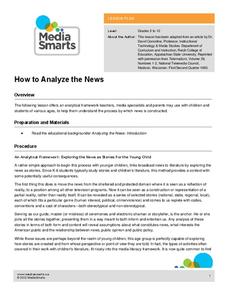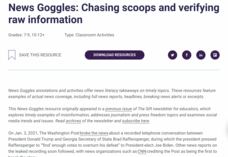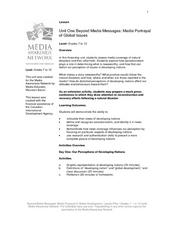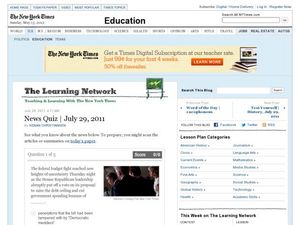Deliberating in a Democracy
Free and Independent Press
Learners determine how free press principles can be compromised. For this global studies lesson, students read an article titled "Free and Independent Press." Learners respond to discussion questions regarding the article.
Curated OER
Johannes Gutenberg and the Printing Press
Students use library or online resources to create time lines on the life of Johannes Gutenberg and tell the impact his invention, the printing press, had on the development of newspapers.
American Press Institute
Introductory News Literacy
Aspiring journalists learn about media literacy, journalism, and the press. Units come complete with handouts, assignment rubrics, notes, and extension suggestions. Each unit also comes with a list of vocabulary words and learning...
Associated Press
AP News
A respected source of local and global news, you can trust this app to provide breaking stories and current events. The interface is highly visual and easy to navigate.
Facing History and Ourselves
Citizen Watchdogs and the News
To conclude their case study of media coverage of the shooting of Michael Brown by a Ferguson, Missouri, police officer, class members consider the role of citizen watchdogs in a democratic society, develop strategies for combating...
Newseum
Fake News Through History: Analyzing Historical Sources
Unfortunately, fake news, fuzzy facts, and bogus news stories are not new phenomena. Class members use a "Fake News Through History" worksheet to analyze historical examples of false, invented, made-up news. Researchers share their...
Newseum
The Fundamentals of News
A short video introduces middle schoolers to different media-related news terms. Viewers then complete a worksheet and discuss the differences between news and journalism, between facts and opinions.
Newseum
Free Press Challenges Through History: Analyzing Historical Sources
The debate over the integrity of stories in media is not new. Young journalists analyze historical sources that reveal freedom of the press controversies and draw parallels to challenges freedom of the press faces today.
Newseum
The Press and the Presidency: Friend or Foe? How the President Is Portrayed
In theory, news reports should be fair and unbiased. Young journalists test this theory by selecting a current news story covered by various media outlets about the President of the United States. They then locate and analyze five...
Media Smarts
How to Analyze the News
Teach kids how to watch television, specifically the news, with this creative idea for learners of all ages from the Media Awareness Network. The elementary school plan focuses on presenting news as a story and uses Jon Scieszka's story...
News Literacy Project
News Goggles: Identifying the News Source
A 25-slide presentation teaches viewers how to identify the source of stories in newspapers and online news sites. The slides show how to locate the byline where either the reporter's name or the wire service that provided the story can...
News Literacy Project
News Goggles: Tracking Developing Stories
A 28-slide presentation introduces viewers to the process reports go through to track and verify developing news stories. Using the reports of the attacks at Atlanta, Georgia, massage parlors as an example, viewers are taught what to...
Newseum
When the News Media Make Mistakes
Mistakes happen. When they happen in news reporting, be it in print or on the internet, journalism ethics requires that the errors be corrected. Young journalists use an Accuracy Checklist to track how news organizations post corrections...
Facing History and Ourselves
Free Press Makes Democracy Work
A unit study of the importance of a free press in a democracy begins with class members listening to a podcast featuring two journalists, one from a United States public radio station and one from Capetown, South Africa. The lesson,...
News Literacy Project
News Goggles: Chasing Scoops and Verifying Raw Information
A 23-slide presentation teaches young media analysts how to identify a scoop or exclusive first report of a breaking story, how these reports become verified, and how subsequent reports in other news sources add information or refocus...
Constitutional Rights Foundation
Understanding Fake News
Fake or fact? Learners must decide while looking at two published "news" stories. A reading about why fake news exists and a checklist on how to evaluate sources rounds out the activity.
Curated OER
Beyond Media Messages: Media Portrayal of Global Issues
Take a close look at news reporting techniques and global issues. Begin by creating a graphic representation of developing nations and defining the term. After class discussion, the second day's activities pick up by deconstructing news...
iCivics
Step Two: The News and You
With so many news resources, scholars likely feel incredibly confused about what the news means. Pupils participate in reading activities, fill out graphic charts, answer questions on worksheets, and complete a quick write activity.
American Bar Association
News Literacy Model Curriculum in Social Studies
Scholars investigate news literacy in the twenty-first century. They use technology, legal decisions, writings, and digital privacy to analyze the topic. Using what they learned, a group assignment looks into both the challenges and...
Curated OER
News
How does broadcast news differ from accounts reported in newspapers? On the radio? Through the Internet? Middle schoolers discuss the news and speak about the differences between news in print and broadcast news. Given a list of six...
Curated OER
News Quiz | July 29, 2011
Kids are asked to first see what they know about news events from July 29, 2011. They are then asked to scan the paper and answer five questions. A good way to keep up on the daily news.
Curated OER
News Quiz: April 17, 2012
What's happening in the news today? Read all about top headlines and breaking news from April 17, 2012. Learners will read or scan the New York Times then take a five question multiple choice quiz.
Curated OER
News Quiz: May 24, 2011
What was new in news on May 24, 2011? Learners get friendly with the New York Times as they read or scan articles published on May 24, 2011. When they are finished reading, they take a quiz containing five multiple choice questions.
Curated OER
News Quiz | May 11, 2012
Take a news quiz! Find out how much your learners know about the events of May 11, 2012 according to the New York Times. They read the paper from that day and then take a five questions quiz.
Other popular searches
- Newspapers
- Usa and World News
- Education News
- Printing Press
- Agriculture News
- News Magazines
- Newspaper Activities
- Current Events Newspaper
- Newsletter
- Newspaper Articles
- News Broadcast
- News Article

























